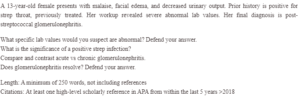Abnormal Lab Values and Glomerulonephritis
Abnormal Lab Values
Urinalysis will reveal pyuria, proteinuria, and hematuria. These substances will be found in the urine due to inflammation and damage to the glomeruli that will cause substances to be filtered into the urine (Kazi & Hashmi, 2020). The patient’s glomerular filtration rate (GFR) will also be reduced. The glomerular cells are damaged in glomerulonephritis, resulting in macrophage proliferation and lowering the GFR rate (Kazi & Hashmi, 2020). In addition, the lab values that will be increased in the blood are urea nitrogen, potassium ions, and creatinine. The damaged glomerulus will no longer excrete substances (Kazi & Hashmi, 2020).
Positive Strep Infection
A strep infection causes glomerulonephritis. Glomerulonephritis due to strep can be mild or severe. Symptom of acute post-streptococcal glomerulonephritis occurs around six weeks after impetigo and two weeks after a throat infection (Dlugasch & Story, 2020). The severe form is characterized by rapid hematuria, which results in hyperkalemia, decreased GFR, and water retention (Dlugasch & Story, 2020). A positive strep infection will help determine the patient’s treatment plan.
Acute vs Chronic Glomerulonephritis
Acute glomerulonephritis rapidly begins after an infection (Dlugasch & Story, 2019). It results in inflammation and damage of the glomerulus. The glomerulus may return to normal after an injury, but if the damage is severe, it may result in chronic glomerulonephritis (Dlugasch & Story, 2019). On the other hand, chronic glomerulonephritis happens gradually over an extended period, resulting in chronic kidney disease (Dlugasch & Story, 2019)
Does glomerulonephritis resolve?
The resolution of glomerulonephritis depends on the cause. On the one hand, glomerulonephritis due to an infection may resolve on its own. Early infection treatment will reduce the chances of long-term injury to the glomerulus (Dlugasch & Story, 2019). However, if hypertension and diabetes, which cause glomerulonephritis, are not treated, irreversible glomerular damage will occur (Dlugasch & Story, 2019).
References
Dlugasch, L., & Story, L. (2019). Applied pathophysiology for the advanced practice nurse. Jones & Bartlett Learning.
Kazi, A. M., & Hashmi, M. F. (2020, December 1). Glomerulonephritis – StatPearls – NCBI bookshelf. National Center for Biotechnology Information. https://www.ncbi.nlm.nih.gov/books/NBK560644/
ORDER A PLAGIARISM-FREE PAPER HERE
We’ll write everything from scratch
Question 

Abnormal Lab Values and Glomerulonephritis
A 13-year-old female presents with malaise, facial edema, and decreased urinary output. Prior history is positive for strep throat, previously treated. Her workup revealed severe abnormal lab values. Her final diagnosis is post-streptococcal glomerulonephritis.
What specific lab values would you suspect are abnormal? Defend your answer.
What is the significance of a positive strep infection?
Compare and contrast acute vs chronic glomerulonephritis.
Does glomerulonephritis resolve? Defend your answer.
Length: A minimum of 250 words, not including references
Citations: At least one high-level scholarly reference in APA from within the last 5fiveyears >2018